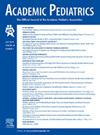The Current State of Pediatric Emergency Care Coordinators—A Role Essential for High-Quality Pediatric Care
IF 2.8
3区 医学
Q1 PEDIATRICS
引用次数: 0
Abstract
Objective
High pediatric readiness is associated with decreased mortality. Pediatric emergency care coordinators (PECCs) are associated with improved pediatric readiness. The presence of PECCs in emergency departments (EDs) after COVID is unknown. Our objectives were 1) to describe and analyze the PECC status in 2021 compared to 2013, and 2) to describe the association of change in PECC status with pediatric readiness scores.
Methods
We performed a retrospective cohort study comparing the 2013 and 2021 National Pediatric Readiness Project (NPRP) assessments. PECC status was defined as: retained, lost, gained or never based on the presence of either a nurse or physician PECC in 2021 compared to 2013. Hospital and ED characteristics were assessed by PECC status using multivariable logistic analysis. Main outcomes include the association of PECC change on adjusted Weighted Pediatric Readiness Score (aWPRS) and NPRP domain scores analyzed using Kruskal-Wallis. We calculated the aWPRS by removing points associated with a PECC (up to 19) from the overall Weighted Pediatric Readiness Score (WPRS) and normalizing to a total of 100 points.
Results
There were 2825 EDs that completed both assessments. General EDs were more likely to have lost a PECC compared to other ED types (P < 0.001). The loss of a PECC was associated with a 7-point lower overall aWPRS and a statistically significant lower score in all pediatric readiness domains (P < 0.001) compared to EDs that retained or gained a PECC.
Conclusions
Hospitals that lost a PECC in 2021 compared to 2013 had a lower overall aWPRS and in individual domains, suggesting the importance of a PECC in pediatric readiness initiatives.
儿童紧急护理协调员的现状-对高质量的儿科护理至关重要的作用。
目的:高儿科准备与降低死亡率相关。儿科紧急护理协调员(PECC)与改善儿科准备有关。COVID后急诊部门是否存在pecc尚不清楚。我们的目标是1)描述和分析2021年PECC状况与2013年的比较,2)描述PECC状况变化与儿科准备评分的关系。方法:我们进行了一项回顾性队列研究,比较了2013年和2021年的NPRP评估。与2013年相比,2021年PECC状态被定义为:保留、丢失、获得或从未基于护士或医生PECC的存在。采用多变量logistic分析评估PECC状态对医院和ED特征的影响。主要结果包括PECC变化与调整加权儿科准备评分(aWPRS)和NPRP域评分的关联,并采用Kruskal-Wallis分析。我们通过从总体加权儿科准备评分(WPRS)中去除与PECC相关的分数(最高19分)并归一化为总分100分来计算aWPRS。结果:共有2825名患者完成了两项评估。与其他类型的急诊科相比,普通急诊科更有可能失去PECC (pConclusion:与2013年相比,2021年失去PECC的医院的总体aWPRS较低,在个别领域,这表明PECC在儿科准备计划中的重要性。
本文章由计算机程序翻译,如有差异,请以英文原文为准。
求助全文
约1分钟内获得全文
求助全文
来源期刊

Academic Pediatrics
PEDIATRICS-
CiteScore
4.60
自引率
12.90%
发文量
300
审稿时长
60 days
期刊介绍:
Academic Pediatrics, the official journal of the Academic Pediatric Association, is a peer-reviewed publication whose purpose is to strengthen the research and educational base of academic general pediatrics. The journal provides leadership in pediatric education, research, patient care and advocacy. Content areas include pediatric education, emergency medicine, injury, abuse, behavioral pediatrics, holistic medicine, child health services and health policy,and the environment. The journal provides an active forum for the presentation of pediatric educational research in diverse settings, involving medical students, residents, fellows, and practicing professionals. The journal also emphasizes important research relating to the quality of child health care, health care policy, and the organization of child health services. It also includes systematic reviews of primary care interventions and important methodologic papers to aid research in child health and education.
 求助内容:
求助内容: 应助结果提醒方式:
应助结果提醒方式:


